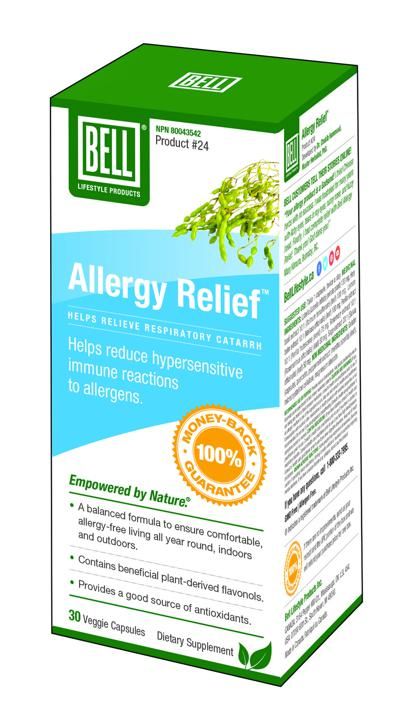Seasonal allergies, also known as hay fever, occurs when the body’s immune system reacts to an external substance such as pollen, resulting in a range of unpleasant symptoms.
One in six Canadians suffer from allergies
Typically, seasonal allergies are present from early spring to mid-fall season. April to June is when tree pollen is prominent, and June through July is largely grass pollen. The remainder of the summer months and heading into fall, it’s the dreaded ragweed that dominates.
Seasonal allergies are not genetic but chances of having it are higher if you have a parent or sibling who suffers from seasonal allergies. Additionally, individuals with eczema and/or asthma are more likely to develop seasonal allergies. If you are allergic to tree, grass and ragweed pollen you’re likely the one carrying around a box of tissue throughout the warmer seasons.
Why doesn’t everyone suffer from seasonal allergies?
In most cases allergens include pollen, dust, feathers and mold. Seasonal allergies are largely triggered by pollen. Pollen is a fertilizing agent produced by male plants which are transported by insects, animals or travels through the air to eventually fertilize the female plant counterparts. Along its travels, pollen may end up in the nose, eyes or mouth, wreaking havoc on those individuals who suffer from seasonal allergies. Typical symptoms of seasonal allergies include:
· Runny nose and/or congestion “stuffy nose”
· Sneezing
· Itchy watery eyes
· Itchy nose, roof of mouth, ear canal
· Postnasal drip which may cause coughing
There are options to help manage symptoms and reduce the occurrence
Reducing the exposure to pollen is very important. Opting to stay indoors when pollen counts are at their highest, usually noon to mid-afternoon is helpful. Nasal irrigation such as a saline rinse help to remove pollen particles that have made their way into the sinus cavities.
There are a variety of pharmaceutical medications that can be used to reduce symptoms but often come with drowsy side effects and need to be taken regularly. Natural health products are often sought out since they also help with symptoms without the drowsy effects.
Here are a few natural ingredients that can help those itchy, watery symptoms:
Quercetin: Quercetin (pronounced kwur-set-in) is a plant-based flavonoid that has anti-inflammatory and anti-viral properties. Quercetin can be found in plant-based foods like apples, broccoli, onions and tomatoes. It’s also in powerful herbs like ginkgo biloba, St John’s wort, and elderberries. This powerful compound has plenty of benefits, including supporting the immune system and providing allergy relief. This antioxidant can also help reduce the histamine response cascade that results in the unwanted symptoms of hay fever.(i) You can read more about Quercetin here
Rosmarinic acid: this natural compound was first discovered in rosemary but can also be found in perilla, sage and lemon balm. One study reported patients who were given rosmarinic acid reported less severe allergic symptoms, such as runny nose and itchy watery eyes. Also, this group had a reduction in inflammatory markers within their mucus compared to the control group. This study reported rosmarinic acid helped reduce both symptoms and inflammatory reactions that promote seasonal allergy responses in the body.(ii)
Black Seed Oil: This oil has over 100 active chemical compounds, but the constituents that have been studied the most are crystalline nigellone, thymoquinone, and beta sitosterol. According to some history studies, black seed oil was used by Egyptian pharaohs and is widely prized throughout the middle east in Ayurvedic medicine. In today's world, this oil has numerous benefits, including helping with allergies. One study showed a significant improvement in seasonal allergy sufferers, where some even became symptom free (iii).
There are many other natural herbs and compounds still being examined for their effect on seasonal allergies. Agents such as Vitamin C, Vitamin D, stinging nettle, N-acetly cysteine are just a few that are still being evaluated.
Enjoying the warmer seasons without feeling congested and constantly sneezing is possible. Using natural products can be a great addition to hay fever symptom management.
One of our favorite products is Allergy Relief by Bell. It contains natural herbs like Holy Basil, which helps break up mucus in the lungs and sinuses. It's also high in antioxidants, helps modulate the inflammatory response, and combats allergies all year round!
(i) Jafarinia M., Hosseini M.S., Kasiri N., Fazel N., Fathi F., Hakemi M.G., Eskandari N. (May 2020). Quercetin with the potential effec on allergic diseases. Allergy, asthma, and clinical immunology;16:36
(ii) Osakabe N., Takano H., Sanbongi C., Yasuda A., Yanagisawa R., Inoue K., Yoshikawa T., (2004). Anti-inflammatory and anti-allergic effect of rosamarinic acid (RA); Inhibition of seasonal allergic rhinoconjunctivitis (SAR) and its mechanism. Biofactors;21(1-4):127-31.
(iii) https://pubmed.ncbi.nlm.nih.gov/23855426/
All information and tools presented and written within this article are for educational and Informational purposes only. Any nutrition, lifestyle and product recommendations are not intended to diagnose, treat, cure, or prevent any disease. Before starting any new supplements, diet and exercise program please check with your doctor or practitioner.

Bell - Allergy Relief - 30 Veggie Capsules
Helps reduce hyper sensitive immune reactions to allergies


